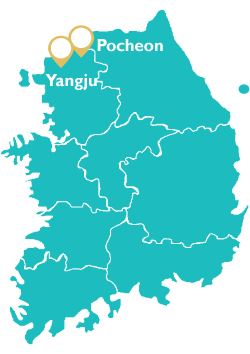
The 2017 Fall Winter Hera Seoul
Fashion Week attracted some
280,000 visitors, attesting to
South Korea's burgeoning fashion
industry. Coupled with the Korean
Wave, the country's innovative approach
to fashion has taken the world by storm.
As a future growth engine tapped by the
Korean government, the country's apparel
and textile industry promises to grow
tremendously in the coming years.
At the heart of the industry's incubation
process is Gyeonggi-do. Literally translated
into "the area surrounding the capital,"
Gyeonggi-do is located next to the
nation's capital of Seoul. It is also the
most populous province in South Korea
with more than 12 million people as of
2014.
With the recent shift of the country's
focus from heavy manufacturing to soft
power industries like service and retail,
Gyeonggi-do has stepped up to the task of
becoming the hub of the textile industry.
Over 2,800 textile-related factories are
located in the province, which produces
59 percent of Korea's textile exports and
83 percent of the country's knit exports.
Located northeast of Gyeonggi-do,
Yangju-si is poised to become the mecca
of the textile industry. Tapped to become
the base of the textile industry complex
by the government, Yangju broke ground
for the G-Textopia in 2011 and is now
home to the Korea High Tech Textile
Research Institute (KOTERI), the Textile
Startup Business Incubation Center, the
Green Knit Research Center and the
Gyeonggi Textile Center (GTC).
The G-Textopia's KOTERI is a unique
government organization fully involved
in everything from textile manufacturing
to distribution. It is the only institute of its
kind to have a research and development
(R&D) sector. The institute is especially
known for its Cold Pad Batch (CPB), innovative eco-
friendly dyeing process and the world's first
liquid ammonia
process technologies to
produce knit textiles.
KOTERI signed a memorandum of
understanding (MOUs) with major textile
and apparel companies like Kolon
Fashion Material and Huvis, and more
recently with Korea Mingbao Textile and
CHTC HELON.
The GTC was also established to promote
the provincial Gyeonggi textile and
apparel industry in the United States following
the Korea-US free trade agreement.
Its operations and services include
trade promotion, new product sourcing
and development, vendor introduction
and consultation. It also set up an office in
Los Angeles to further promote trade.
Thanks to its ideal business environment,
Yangju-si is already teeming with
textile, apparel and textile manufacturing
companies, including Daejin Textile Co,
Dowel International Co. Ltd., Elzion,
Heasung Textile, Kwang Il Textile Co.
Ltd., Nam Kwang Textile Co. and Young
Shin Textile Co.
Bordering Yangju is the mountainous,
up-and-coming city of Pocheon. Home to
roughly 2,166 small and medium-sized
manufacturers of textiles and metal products,
including Hyesung Knitting
Machinery Co., Ltd., Seong Shin Textile
Co., Ltd. and Samheung Co., Ltd.,
Pocheon is quickly developing into an
industrial powerhouse.
The city is currently focusing on developing
industrial complexes for the fiber
and furniture industries, including the
Jangja Industrial Complex and the
Pocheon Eco Development Co. Ltd.
(Yongjeong Industrial Complex), both of
which are expected to revitalize the local

economy by forming a system of knitting
and dyeing factories, deregulation and incentives. The Jangja Industrial Complex
alone is expected to produce an economic
effect of KRW 166.5 billion (USD 148.02
million) and a USD 167 million increase
in exports. The provincial government is
also working to further deregulate and
amend ordinances to develop a more
business-friendly ecosystem.
In 2015, Pocheon also landed the K-Design
Village Project, a joint operation
with the Gyeonggi Province, the Ministry
of Land, Infrastructure and Transport and
the Korea Fashion Designers Association.
The project, a combination of a 500,000 ㎡
industrial complex and a 300,000 ㎡ park,
will foster the region's textile and furniture
industry as well as promote tourism.
A total of KRW 700 billion (USD 622.3
million) will be invested in the project,
including KRW 200 billion (USD 177.8
million) in government spending and
KRW 500 billion (USD 444.5 million) in
private capital. Pocheon is currently
focusing on creating transportation networks
by creating and expanding roads
and is expected to be completed by the
year 2022.